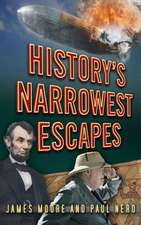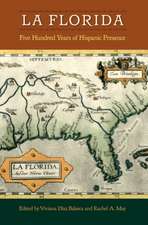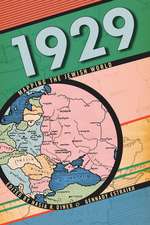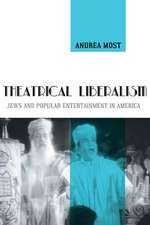Terror in the Countryside: Campesino Responses to Political Violence in Guatemala, 1954–1985: Ohio RIS Latin America Series, cartea 35
Autor Rachel A. Mayen Limba Engleză Paperback – 14 oct 2001
The key to democratization lies within the experience of the popular movements. Those who engaged in the popular struggle in Guatemala have a deep understanding of substantive democratic behavior, and the experience of Guatemala’s civil society should be the cornerstone for building a meaningful formal democracy.
In Terror in the Countryside Rachel May offers an in-depth examination of the relationship between political violence and civil society. Focusing on Guatemala, Professor May develops a theoretical scheme that calls into question the more conventional understandings of both violence and civil society.
By elaborating a cyclical model of violence, and suggesting a typology of rural (campesino) popular organizations, Terror in the Countryside provides both a history and an analysis of late-twentieth-century violence and of the role of campesino organizations during the worst years of conflict in Guatemala.
This history details the way ideologies, organizational structures, and mobilization strategies evolved in response to the climate of terror, emphasizing the courage and sacrifice of those who worked for justice and human rights.
This book argues that the peace accords can be considered only as a first step to eliminate a violence that has become deeply rooted in the political life of the country.
In Terror in the Countryside Rachel May offers an in-depth examination of the relationship between political violence and civil society. Focusing on Guatemala, Professor May develops a theoretical scheme that calls into question the more conventional understandings of both violence and civil society.
By elaborating a cyclical model of violence, and suggesting a typology of rural (campesino) popular organizations, Terror in the Countryside provides both a history and an analysis of late-twentieth-century violence and of the role of campesino organizations during the worst years of conflict in Guatemala.
This history details the way ideologies, organizational structures, and mobilization strategies evolved in response to the climate of terror, emphasizing the courage and sacrifice of those who worked for justice and human rights.
This book argues that the peace accords can be considered only as a first step to eliminate a violence that has become deeply rooted in the political life of the country.
Din seria Ohio RIS Latin America Series
-
 Preț: 286.14 lei
Preț: 286.14 lei - 23%
 Preț: 492.06 lei
Preț: 492.06 lei -
 Preț: 257.18 lei
Preț: 257.18 lei -
 Preț: 289.01 lei
Preț: 289.01 lei -
 Preț: 291.90 lei
Preț: 291.90 lei -
 Preț: 289.58 lei
Preț: 289.58 lei -
 Preț: 258.16 lei
Preț: 258.16 lei -
 Preț: 193.90 lei
Preț: 193.90 lei -
 Preț: 257.55 lei
Preț: 257.55 lei -
 Preț: 287.06 lei
Preț: 287.06 lei -
 Preț: 250.81 lei
Preț: 250.81 lei - 5%
 Preț: 157.48 lei
Preț: 157.48 lei - 7%
 Preț: 186.33 lei
Preț: 186.33 lei - 37%
 Preț: 134.11 lei
Preț: 134.11 lei - 20%
 Preț: 179.69 lei
Preț: 179.69 lei - 18%
 Preț: 176.48 lei
Preț: 176.48 lei -
 Preț: 279.07 lei
Preț: 279.07 lei - 19%
 Preț: 162.79 lei
Preț: 162.79 lei
Preț: 229.03 lei
Nou
Puncte Express: 344
Preț estimativ în valută:
43.82€ • 45.88$ • 36.26£
43.82€ • 45.88$ • 36.26£
Carte tipărită la comandă
Livrare economică 05-19 aprilie
Preluare comenzi: 021 569.72.76
Specificații
ISBN-13: 9780896802179
ISBN-10: 0896802175
Pagini: 256
Dimensiuni: 140 x 216 x 18 mm
Greutate: 0.36 kg
Ediția:1
Editura: Ohio University Press
Colecția Ohio University Press
Seria Ohio RIS Latin America Series
ISBN-10: 0896802175
Pagini: 256
Dimensiuni: 140 x 216 x 18 mm
Greutate: 0.36 kg
Ediția:1
Editura: Ohio University Press
Colecția Ohio University Press
Seria Ohio RIS Latin America Series
Notă biografică
Rachel A. May teaches human rights and Latin American studies courses at the University of Washington, Tacoma. She is currently working on a book about popular revolutionary movements in Argentina during the 1960s and 1970s.
Descriere
The key to democratization lies within the experience of the popular movements. Those who engaged in the popular struggle in Guatemala have a deep understanding of substantive democratic behavior, and the experience of Guatemala’s civil society should be the cornerstone for building a meaningful formal democracy.In










